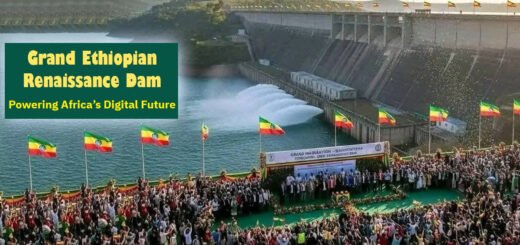Empowering Africa: The Digital Revolution in Key Sectors
Leveraging Digital Technologies for Sustainable Development
Introduction
Africa stands at a critical juncture in its development trajectory, with digital technologies offering unprecedented opportunities for transformation. The continent has made significant strides in recent years, with the adoption of mobile technology and the internet reaching unprecedented levels. However, to fully realize the potential of the digital revolution, Africa must address key challenges and leverage digital technologies to transform key sectors such as agriculture, healthcare, education, and financial services.
Current State of Digital Transformation in Africa
Africa has experienced remarkable growth in digital connectivity, driven by the proliferation of mobile phones and improved internet infrastructure. According to the International Telecommunication Union (ITU), the number of mobile broadband subscriptions in Africa has grown significantly, reaching 1.18 billion in 2020. This growth has been fueled by the increasing availability of affordable smartphones and the expansion of 3G and 4G networks across the continent.
Despite these advancements, Africa still lags behind other regions in terms of internet penetration and broadband speeds. According to the ITU, Africa has the lowest internet penetration rate in the world, with only 28.2% of the population having access to the internet in 2020. Additionally, broadband speeds in Africa remain below the global average, limiting the potential of digital technologies to drive economic growth and development.
Key Sectors for Digital Transformation
- Agriculture: Agriculture is a key driver of economic growth in Africa, employing the majority of the population and contributing significantly to GDP. Digital technologies have the potential to revolutionize agriculture in Africa, improving productivity, reducing post-harvest losses, and enhancing market access for smallholder farmers. For example, platforms such as Farmcrowdy and Hello Tractor are leveraging digital technologies to connect farmers with resources and markets, transforming agriculture into a more data-driven and efficient industry.
- Healthcare: Digital technologies are transforming healthcare delivery in Africa, improving access to quality healthcare services and reducing healthcare costs. Telemedicine platforms such as Baobab Circle and LifeBank are enabling remote consultations and the delivery of essential medical supplies, particularly in rural areas where access to healthcare is limited. Additionally, digital health records and mobile health apps are improving healthcare delivery and patient outcomes across the continent.
- Education: Digital technologies are enhancing access to quality education in Africa, overcoming barriers such as distance and lack of resources. E-learning platforms such as Andela and Khan Academy are providing students with access to quality educational resources and personalized learning experiences. Virtual reality (VR) and augmented reality (AR) are also being used to create immersive educational experiences, bridging the gap between theory and practice.
- Financial Services: Digital financial services are revolutionizing the financial landscape in Africa, improving financial inclusion and expanding access to banking services. Mobile money services such as M-Pesa have transformed the way people access financial services, particularly in rural areas where traditional banking services are limited. Additionally, fintech startups are leveraging digital platforms to provide innovative financial solutions, such as microloans and insurance, to underserved populations.
Challenges to Digital Transformation
Despite the progress made, Africa still faces significant challenges in fully harnessing the potential of digital technologies. These challenges include:
- Infrastructure: Limited access to reliable electricity and internet connectivity remains a major barrier to digital transformation in Africa. According to the World Bank, more than half of the population in Sub-Saharan Africa lacks access to electricity, and internet penetration rates are among the lowest in the world.
- Digital Skills: A lack of digital skills among the population hinders the uptake and effective use of digital technologies. According to the World Economic Forum, only 21% of adults in Africa have basic digital skills, compared to a global average of 49%.
- Regulatory Environment: Complex regulatory frameworks and policies can impede innovation and investment in digital technologies. According to the World Bank, Africa lags behind other regions in terms of the ease of doing business, with cumbersome regulations and bureaucracy hindering entrepreneurship and investment.
Strategies for Accelerating Digital Transformation
To accelerate digital transformation in Africa, several strategies can be implemented:
- Investment in Infrastructure: Governments and private sector partners must invest in infrastructure, including broadband networks and reliable electricity, to support the widespread adoption of digital technologies.
- Digital Skills Development: Education and training programs should be implemented to equip individuals with the digital skills needed to participate in the digital economy.
- Policy and Regulatory Reform: Governments should create an enabling environment for digital innovation by streamlining regulations and fostering a competitive market.
- Partnerships and Collaboration: Collaboration between governments, the private sector, and civil society is essential to drive digital transformation and ensure its benefits are shared equitably.
Conclusion
Africa’s digital revolution holds immense promise for transforming key sectors and driving sustainable development across the continent. By addressing key challenges and leveraging digital technologies, Africa can unlock new opportunities for growth, innovation, and prosperity. With the right investments and policies, Africa can lead the way in the digital revolution and build a brighter future for its people.
References
- International Telecommunication Union (ITU). (2020). Measuring digital development: Facts and figures 2020. Retrieved from https://www.itu.int/en/ITU-D/Statistics/Documents/facts/FactsFigures2020.pdf
- World Bank. (2024).Digital Transformation Drives Development in Africa. Retrieved from https://www.worldbank.org/en/results/2024/01/18/digital-transformation-drives-development-in-afe-afw-africa#.
- World Economic Forum. (2020). The Global Competitiveness Report 2020. Retrieved from https://www.weforum.org/publications/the-global-competitiveness-report-2020/
- The World Bank in Africa. https://www.worldbank.org/en/region/afr
Related posts: Bridging the digital divide for inclusive & sustainable development
Reflection on the Digital Transformation Strategy for Africa (2020-2030)




[…] post: Leapfrogging the Future: How AI can Transform Africa | AI Capacity Building in Africa | Unlocking Africa’s Potential…
[…] ABNT. (2024). The Impact of Artificial Intelligence on African Economies. Retrieved from https://abnt.com/?p=37 […]
[…] Related posts: Bridging the digital divide for inclusive & sustainable developmentReflection on the Digital Transformation Strategy for Africa (2020-2030)…
[…] posts: Bridging the digital divide for inclusive & sustainable developmentReflection on the Digital Transformation Strategy for Africa […]
[…] Related posts: Reflection on the Digital Transformation Strategy for Africa (2020-2030) […]